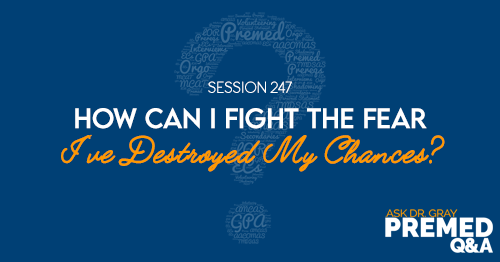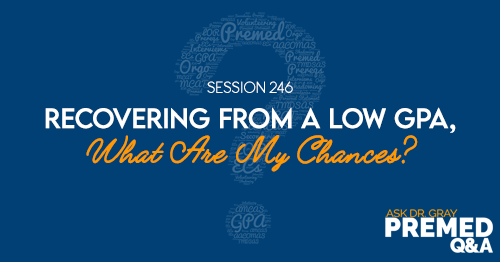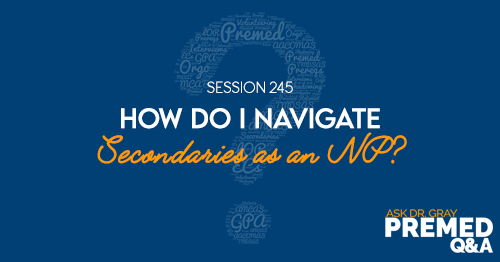Apple Podcasts | Google Podcasts
Session 184
This premed has a list of questions stemming from her nontrad experiences – from scholarships and prereqs, to MCAT prep and writing activities. Let’s answer them!
Ask Dr. Gray: Premed Q&A is brought to you by Blueprint MCAT. Listen to this podcast episode with the player above, or keep reading for the highlights and takeaway points.
The episodes in this podcast are recordings of our Facebook Live that we do at 3 pm Eastern on most weekdays. Check out our Facebook page and like the page to be notified. Also, listen to our other podcasts on MedEd Media. If you have any questions, call me at 617-410-6747.
[00:21] Question of the Day
“I’m a non traditional applicant. I will be applying next year and I’m a career changer. So currently, I’m a registered dietitian and pursuing medicine.”
My first category is pertaining to the Health Professions Scholarship Program. I listened to another episode where you were talking about how recruiters might give the wrong information. And I’ve received conflicting information regarding if I need acceptance or not to apply to HPSP.
One recruiter told me that I just need my MCAT score and a list of schools I plan to apply to. And I had another person tell me that I need an acceptance letter.”
A: I think they’re both right. Depending on what the answer they’re giving you is the question. The information I’m giving you is how I understand it, it may have changed. But from how I understand it, you can apply with an MCAT score, but you can’t officially be accepted until you have an acceptance.
Those are two different things – you can apply, but you can’t be accepted unless you’re awarded the scholarship.
[02:17] Residency Competitiveness
Q: If I get into USUHS, how would you compare military residency competitiveness to civilian residency competitiveness?
A: The military residencies are only for military members. There aren’t a lot of military residencies. But there aren’t a lot of military members applying for those residences. At the end of the day, the numbers work themselves out.
Try to find data out there in terms of how many of each available residency are offered each year. Every year, they’re trying to figure out their numbers. And that data is somewhat public, you can typically find that information.
There may be 10 residency spots, but only five of them are military spots, because that’s all they have. And then the other five are civilian spots.
Do You Want to Be in the Military? – That’s the Question!
Ultimately, there are a couple questions that you need to ask yourself. If that’s what you’re using to determine whether or not you’re going to apply for HPSP, then your thinking is skewed.
The first question you should ask yourself is do you want to be in the military? And then after that, you figure it out.
Are you okay, looking forward, getting to the point when you’re applying for residency in the military, being told that this new specialty that you fell in love with is not an option for you? Then you have multiple options from that point.
You can just go be a general medical officer, serve your time, and get out and then go to a residency. Or you can choose to do another residency that they’ll accept you for.
[06:13] MCAT Prep and Prereqs
Q: I’m juggling with two different timing options, which I know I guess the best time to take is when you’re ready to take it. Aside from that, the two dates I’m tentatively considering are January 2023, or March 2023. And there are pros and cons to both. I’m finishing four more prerequisites. I have Gen. Chem I and II, and Physics I and II. How important are Gen. Chem II and Physics II in terms of the MCAT?
A: Physics II is not as important as Gen. Chem II.
Q: A lot of the prereqs that I have are old. Is it better to practice concurrently with content review, or make sure I fill in the content gaps first and then do my practice?
A: It’s fine doing the practice with your content review, and just not give yourself a hard time when you struggle with the questions knowing that you’re still refreshing the content.
[08:43] Lumping Volunteering Activities Into One Activity
Q: I’m down to 12 activities after I add some shadowing in there. I’m currently sitting at about 7,000 hours clinical, 500 of volunteer, and 550 of research.
I’ve done a hodgepodge of different short-term volunteering things since 2017. I’m planning to put those as one category of volunteering, and then describe the different things I did within that. Is that advisable?
Mappd also prompts you to put in a point of contact for that. But since they all are different activities, should I just pick a person?
A: Putting all your volunteering stuff under one category is fine. In terms of contact, just pick a random person, whether it’s the most recent one or the person who knows you the best. There’s a 99.9% chance they’re not going to be contacted.
[10:02] Important Advice When Writing Your Activities
Q: I also have several certifications that I was also planning just to lump into one. Is that also advisable? Or would you recommend listening? With that, I have several options to fill in the remainder. I’m between different things I could put in hobbies or jobs that I held during undergrad. Do you have any advice in terms of how to balance my activities?
A: Put in the most important ones. There are no games to be played there. I always recommend putting in one hobby. You can also put in jobs from undergrad. If they take up a significant amount of time, they may explain grades from your college years, if you also worked full-time, or close to full time.
Doesn’t Have to Be All Clinical
“A lot of students, especially nontrads, make the mistake of only putting clinical type experiences into their application.”Click To TweetAt the end of the day, don’t play a game and try to force things here and there to paint this picture.
If you have enough clinical experience in one arena to show, and one of your jobs potentially has a lot more leadership that you want to highlight, then that’s fine to do. There’s no right or wrong way.
No Double-Dipping of Hours
There are no rules in the activity section so you can do whatever you want, as long as that makes sense. But be careful not to double-dip hours. For instance, if you have one job where you had some leadership positions, and it was also clinical, don’t count the hours twice.
[13:53] Trend Matters
Q: If I’m able to get a good MCAT score, and if I’m able to write a good personal statement, do my stats put enough? If I get A’s in the classes I’m taking now, I’ll have a 3.4 cumulative GPA and a 3.51 science GPA. And my graduate GPA is 3.93.
A: Look at the overall trend. It’s hard to say yes or no without looking at all the numbers in front of me. But so far, those numbers don’t scare me. Obviously, MCAT is a big part of it and the rest of your story.
“Being a nontraditional student and the journey that you've been on all contribute to that story.”Click To TweetYou have to be good enough to get to the point where the school is comfortable with your stats and they’re comfortable with your academic ability.
[17:02] Difficulty with Identifying the “Seed”
Q: I didn’t ever think I’d become a doctor. And I wasn’t really exposed to the clinical setting until I became a dietitian. And then that kind of led me to that point where I did some retrospective reflection on wanting to become a doctor. So in my mind, I was thinking about it as my seed, but then I heard conversations with other students that your prior health care experience should be your seed. So I have trouble narrowing down to what my seed is.
A: As a registered dietitian, then your seed is becoming a dietitian. Maybe you really wanted to be a dietitian then at some point, you have this pivot point where you want to do more and you want to become a physician.
Now, you have to keep digging. And if you ever thought about being a physician earlier, but dismissed it for whatever reason, then your seed is really that going towards medicine. Then you just stomped on that seed and never nourished it, so it never grew.
[18:55] Financial Resources
Q: Do most HPSP applicants, at least to your knowledge, have additional sources of income while they’re going through? Or do they rely solely on that stipend?
A: A lot of schools will not let you have additional sources of income. They won’t let you work and that’s part of the paperwork that you sign.
Potentially, students just take out more loans. And so, go to your financial aid office. They’ll look at what your scholarship is, and the money that you’re given as a stipend. And if they see a gap, you can still take out regular federal loans for it.
[20:53] Check Out Blueprint MCAT and Application Academy
As you’re starting your MCAT prep, the earliest fastest thing you can do right now is go sign up for a free account at Blueprint MCAT. They have over 1,600 flashcards and start learning what you need to learn.
We’re bringing in more advisors onto the Mappd team so we’re having more voices to help students going through Application Academy. So stay tuned for that.
Links:
Medical School HQ Facebook page
Medical School HQ YouTube channel
Instagram @MedicalSchoolHQ
Join the Application Academy!
The Premed Playbook: Guide to the Medical School Personal Statement
The Premed Playbook: Guide to the Medical School Application Process
SEARCH SITE
LISTEN FOR FREE












